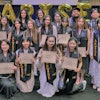 Dr. Russell Jeung is a professor of Asian-American studies at San Francisco State University.
Dr. Russell Jeung is a professor of Asian-American studies at San Francisco State University.
Nationally, Burmese-Americans have an abysmal 39 percent high school dropout rate—almost twice the rate of non-Asians in this country—so, not surprisingly, many of them live below the poverty line. Burmese are among the most numerous refugee groups to turn to the U.S. in recent years, according to the Department of Homeland Security, having fled political, religious, and economic persecution since 2004.
Furthermore, school attendance wasn’t compulsory in the refugee camps in Thailand, where thousands languished for years. Lessons at the camps often consisted of routine memorization rather than critical thinking analysis. Consequently, newcomer Burmese families in the U.S. have a tough time keeping their kids engaged with school, where they struggle with English and basic subjects.
At SFSU, today marks the fourth year that Jeung, a professor of Asian-American studies, has arranged for his students to host juniors from Oakland International High School, to familiarize them with college life and encourage them to apply for admission. Oakland International specializes in enrolling immigrants, particularly refugees whose families have little or no formal schooling.
Each year, the visiting high school group has represented myriad countries around the globe, Jeung says, and this year is no exception. The number of visitors has varied from one year to the next, although Jeung expects about 70 this time, and it has numbered 100 sometimes. The number of high schoolers with ancestral roots in Burma, also called Myanmar, has been as high as 30.
The day-long SFSU tours consist of a college student being paired with a high school junior for one-on-one conversations, Jeung says. The younger students shadow the older ones around SFSU to their classes and visit offices such as admissions and financial aid.
“Just walking around campus gives them a better idea of what college is like,” Jeung says.














